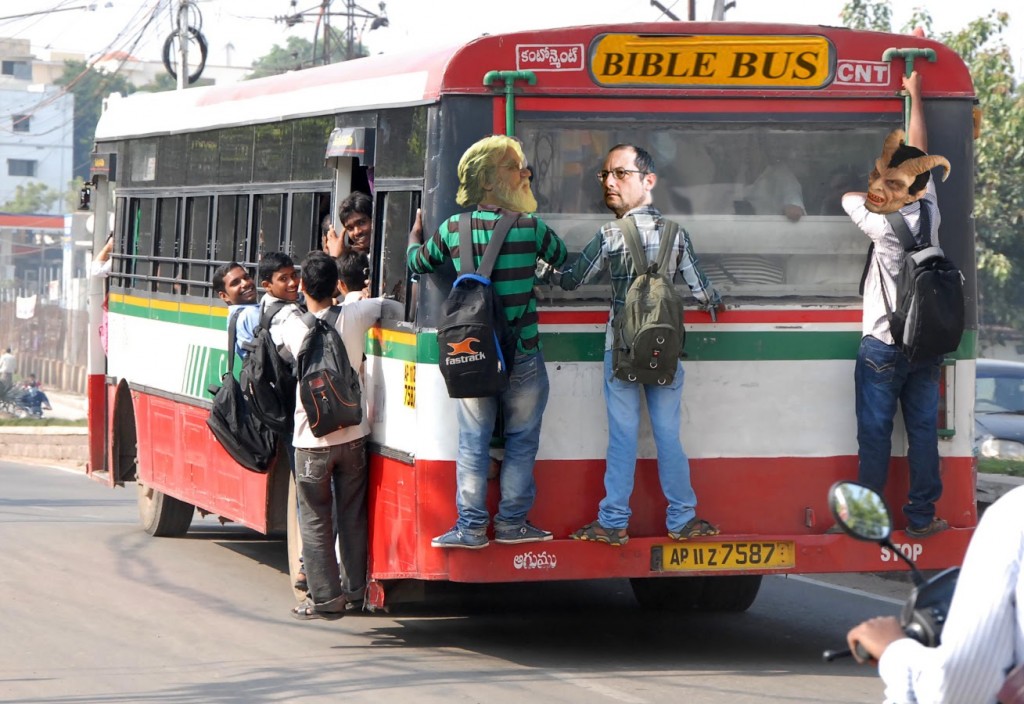 Once Tony Soprano shared an insight with his therapist. He had “mother issues,†you see. Pretty serious ones: she wanted to have him rubbed out—and tried! Anyway, Tony said our mothers are like buses that drop us off and drive away. We ought to be grateful for the ride. Instead, we chase after the bus, desperate to get back on. Naturally, the wisdom of Tony is applicable to much of life, but here (all too predictably) I want to apply it to our interest in the Bible. What’a ya gonna do?
Once Tony Soprano shared an insight with his therapist. He had “mother issues,†you see. Pretty serious ones: she wanted to have him rubbed out—and tried! Anyway, Tony said our mothers are like buses that drop us off and drive away. We ought to be grateful for the ride. Instead, we chase after the bus, desperate to get back on. Naturally, the wisdom of Tony is applicable to much of life, but here (all too predictably) I want to apply it to our interest in the Bible. What’a ya gonna do?
I am right now working on a book called Bart Ehrman Interpreted. Like me, he was once a fundamentalist, then an evangelical, then an agnostic, and finally an atheist. It happens to a lot of us. In this evolutionary path many factors are at work, but one of the biggies, one might even say the fulcrum, is the Bible and our devotion to it. We get on the Bible Bus in our early years, eager to ride it to heaven! We have been told it will get us there as we take an exciting ride through the exotic neighborhood of the Old Testament, the shining landscape of the New Testament, the farther lands of Church History and Theology. So in order to appreciate these sights all the more, we study up on the guidebook, the Bible and commentaries on it. But every once in a while we are surprised to hear the sputtering ring of the stop signal, and the Bible Bus pulls over to let someone off. This surprises and concerns us! Why would anyone want to disembark from the Bible Bus? It’s so comfortable! The company is so pleasant! The group singing is such fun! Why? We are mystified.
That is, until we find ourselves reaching for the stop cord and getting up from our seat. Now we know why the others did the same. The closer we studied that guidebook, the more troubled we became. There were certain… discrepancies. Hell, was the bus actually going anywhere? We could swear we saw some of the same sights more than once! Were we just going in circles? Were we even moving?
Occasionally we look at the neighborhood we got dropped off in, and it looks pretty drab compared to the storybook paradise we used to think we were headed for. And in that moment, we think, as Tony Soprano said, of chasing that bus, or maybe waiting for another one to come along. But when one does, we realize we don’t have the required fare to get on. We’re plumb out of credulity! We’ve lost the overriding will to believe, otherwise known as the will to make-believe. So we start exploring the new neighborhood. Most of us sooner or later find new accommodations, discovering that living in the real world is not so bad, that it’s pretty good in fact, better than the fantasy dreamscape that once beguiled us.
But there are some of us, like Bart Ehrman, me, and a huge number of others, who manage to sneak back onto the bus, but we’re riding on the bumper!  We feel good being back on the Bible Bus—but without getting in! We got hooked on the Bible, and the hook went deep. It might be pretty hard to get it out without disemboweling ourselves! The Bible has become part of us, like it or not. But then what’s not to like?
We feel good being back on the Bible Bus—but without getting in! We got hooked on the Bible, and the hook went deep. It might be pretty hard to get it out without disemboweling ourselves! The Bible has become part of us, like it or not. But then what’s not to like?
We hopped off the bus in the first place because the bus was arriving at a crossroad. We wanted to understand the biblical text better and better, as all Bible-believers are supposed to want to do. But even to have gotten to this point we had already worked our way half-way off the bus without realizing it, because everybody in the seats around us wasn’t really that curious about the Bible. They just wanted to cling to the proof texts that promised them admission to Heaven. In fact, they may have been reluctant to explore the rest of the Bible precisely because it might complicate the picture, might loosen their tight grip on that hand full of cherished, out-of-context verses.
And that’s what had happened to us. We saw the crossroads approaching: we would have to decide whether we were more interested in Christian faith or in the Bible, because we saw we couldn’t have both. We had found that the religious beliefs about the Bible were a hindrance to understanding the Bible. “Hmmm… here’s a contradiction! But, oh yeah, there can’t be any contradictions in the Bible! So I guess they’ll have a clever solution to the riddle when I get to heaven!†But we got tired of that after a while. We began to wonder. “Suppose it is a contradiction? How would that have come about? Two different sources editorially combined? Two different writers’ opinions? But if they’re only opinions, that means they’re not ‘revelations’… But it makes more sense that way! Do I want to find out the truth? Or do I want to keep chanting those proof-texts?†That’s where we got off.
And back on, on the bumper—and under the bus, to see exactly how it worked.
Hegel and Kant couldn’t and probably wouldn’t have used a stupid analogy like the one I’ve beaten to death here, but they were making a related point. For them, the Bible and supernaturalist religion were storybook versions of moral instruction for the childish of mind. Kant said that the miracles were like parables, simply a means to an end; if they got their point, their lesson, across, fine. But if not, who needs ‘em? And if they do their job, who needs ‘em either?
It’s much like Zen. The monks found the old doctrines and techniques ineffective in producing Satori, Enlightenment, so they invented new gimmicks like the answerless riddle of the koan (“What is the sound of one hand clapping?â€) designed to launch you off the track of mundane reasoning into a higher stratosphere. The main insight of Zen was that, a la Kant, if the old trappings of religion did not do the trick, to hell with ‘em!
But, as I said, even if they did, who needs ‘em? If they served their purpose, if they got you there, isn’t it kind of like keeping the Coke bottle after you’ve finished the soda? I love the Buddhist parable of the Raft. Imagine a man fleeing an angry mob through the forest. Luckily, he has a good head start. He stops short at a riverbank. He’s got to get across! But there’s no bridge, no stepping stones, and those crocodiles aren’t helping either! What are his options? After a moment’s thought, he begins gathering bamboo stalks and binding them together with tough vines. Soon he’s got a makeshift raft and begins poling it across the river, just as his pursuers arrive at the river. They shout curses and shake their fists, but there’s nothing more they can do. (I’m tempted to say their quarry gives them the finger, but I guess that’s inappropriate for a Buddhist parable.) Well, he makes it across. He’s safe! Now what do you think he ought to do with that raft? Out of gratitude to the raft, should he strap it onto his back and carry it around like a tortoise shell? Of course not! What a useless encumbrance it would be! Better just to dump it and get moving!
In the same way, the various features of religion are purely instrumental in nature. I just ate a couple of yummy fiber brownies. Is there any reason to keep the wrappers? No, they served their modest purpose, and now it’s time for them to exit Stage Garbage Can. You discard them precisely because they did what they were designed to do! One might object that this analogy is apt only for Eastern religions, where the goal is one’s own Enlightenment. In a paradoxical sense, it is “selfâ€-centered. But in Western religion it is (supposedly) quite different: religion is centered on God. Worship benefits the worshipper, sure, but in the same way turning toward the sun benefits green plants, because it nourishes them. We are made to worship our Creator, so things are out of whack if we don’t. But God deserves the acclaim.
And yet I think the difference is finally overcome, since in Vedanta Hinduism and Mahayana Buddhism one seeks to break down the (illusory) wall between Self and Other, to realize the unity, actually the identity, of the individual atman “within†and the universal Brahman or Sunyata “without.” This amounts to the humble self-abnegation of the individual in favor of the all-inclusive One. This seems to me quite parallel to the worshipper losing himself in the Worshipped.
Anyway, I think the Bible contradictions that shook us loose from fundamentalism are in effect biblical koans. They bring us to the end of faith and bid us jump off the track of conventional religious belief. They catapult us into Enlightenment (think equally of the European Enlightenment or of Eastern mystical Satori), and once they do, we can discard them—because they’ve served their purpose! The Bible nudged (or slapped) us awake so we wouldn’t miss our stop.
So says Zarathustra.


11 Responses to Chasing the Bus